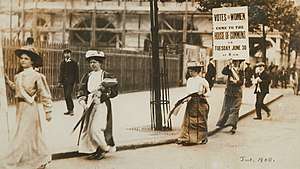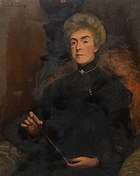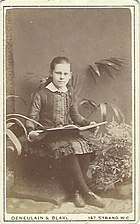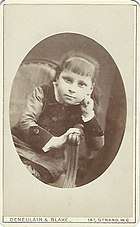Dora Beedham
Dora Beedham (3 June 1879 – 1969) was a British nurse from the social activist Spong Family and suffragette who joined the Women's Social and Political Union (WSPU) in 1908 and was imprisoned and force-fed.

Biography
Born as Dora Spong in Balham, London in 1879, she was the fourth daughter of Frances Elizabeth Scott (1843-1929)[1] and father James Osborne Spong (1839-1925) who ran a labour-saving device engineering company, Spong & Co,[2] who made and sold devices which may 'help women move out of the kitchen'[3] like coffee grinders, corkscrews,[4] knife cleaners, burglar and fire alarms, animal traps and a meat mincer which had sold 200,000 by 1882. Spong & Co. mincers were used in the largest public and private institutions in the land.[2][5]
Her mother was a vegetarian - Dora and the other daughters followed suit. In June 1910 Dora Spong began training as a midwife, a career she was still following in 1915.[6] She married Ralph John Beedham (1879-1975) on 14 October 1910[4] with whom she had two children:[5], Ruth (born 1914) and David (born 1918.[4] Ralph was a woodcut engraver for artists (a formschneider)[4] , a Quaker and pacifist, and conscientious objector during World War I. Both vegetarians, they had farmed in Herefordshire, but later had to give it up, living with the Spong family. They were known to wear loose clothing and sandals.[5]
Imprisonment and protest
Dora Spong's parents supported her activism and that of her sisters. Their mother Frances Spong attended WSPU demonstrations.
Initially working in the poorest areas of London, Tottenham and Battersea, Dora Spong was a nurse and midwife[4] and sanitary inspector to slum residents. She was a member of the Independent Labour Party, Finsbury branch.[5] She joined the Women's Social and Political Union, the suffragette activists, in 1908.[5][4]
.jpg)
Spong was involved in WSPU poster protests, where small groups of women carrying and selling Votes for Women or other publications for handing out could progress through London streets, raising awareness and publicity, with less risk of violent reactions from objectors, compared to mass demonstrations.
A picture in the Museum of London (see above) shows Dora Spong with Dorothy Hartopp Radcliffe, Hilda Dallas and Charlotte Marsh with a placard promoting the Women's Parliament on 30 June 1908.[7]
Following that event, the suffragettes tried to march from Caxton Hall to the House of Commons into a crowd of around 10,000 who tried to harass them, with only 1700 police to keep order, and was amongst the seventy-five suffragettes were arrested in the ensuing aggression. Spong was charged for the first time[8] the next day on 1st July 1908[4] for obstruction and sentenced to a month in Holloway prison, where her fellow members of Finsbury ILP wrote to her in support and 'admiration of the courage and determination in submitting to the onus of the prison cell in the women's cause'. She became ill and was released early. Another arrest with a hundred suffragettes marching on the House of Commons on 12th July 1909 has no complete record of her sentence.[4]
In 1911, Beedham (née Spong) was one of the seventeen WSPU members of the forty-two signatories to the petition from Ellen Avery to Constance Lytton's brother Lord Lytton expressing gratitude for his faith in women's suffrage movement such that "in the years to come the Women of our Race - strong in the Freedom that you have done so much to win - will abundantly justify that faith."[5]
Beedham's name was not found on the 1911 Census nor are her sisters apart from Annie (when many suffragettes refused to be 'counted' without the right to vote).[4]
In 1912 she was charged with breaking windows with a hammer, with Constance Moore who had a poker at Westbourne Grove Post Office. Their sentence was two months with hard labour in Holloway Prison. And only a month after her marriage, in November 1914, she was arrested at Black Friday; as with other suffragettes, no charges brought.[4]
Dora Beedham was given a Hunger Strike Medal 'For Valour'.
From 1920 to 1936 she, her husband and family were living in Hendon in North London]], in the latter year moving to Finchley[9] where they were still living in 1949.[10]
Legacy
Beedham's grand-daughter Joanna Wikenden Ibarra wrote about her brother Peter discovering her WSPU certificate signed by Emmeline Pankhurst stating she was 'ever ready to obey the call of duty' and her Holloway brooch - a portcullis with a broken chain - which her family knew from childhood 'celebrated victory in the fight for women's suffrage.'[11] Her great-nephew Roger Spong was an English international rugby player and a director of her father's company (which continued in business until the hardware division was finally taken over by Salters in the 1980s).[2]
Spong Family

The Spong Family were a family of political and social activists. The children of Frances Elizabeth Scott and James Osborne Spong were: Minnie Frances Spong (1869–1953); Dora Spong (1879–1969); Annie Eliza Spong (1870-1957); Florence Spong (1873–1944) and Irene Osborn Spong (1882–1960). There were also two brothers: James William Spong (1879-1944), [4] who succeeded his father in running Spong & Co., and Francis Osborne Spong (1875-1878).[4]
Minnie 'Frances' Spong
The oldest daughter Minnie Spong (1863-19 June 1953), who became a teacher in Africa, wanted to be known as 'Frances' after their carnivore father named his meat mincing gadget 'the Minnie', and she only returned to Britain in 1911.[5]
Annie Spong

Annie Eliza Spong (1870-1957) was born in Streatham in London. She was a suffragette, embroiderer and portrait artist who painted several Lord Mayors of London in her career. Active from 1888 when she was a student at the Herkomer Art School to at least 1910.[12] She was unmarried but lived with a fellow artist Joseph Sydell, whom she met at art college. Annie took up dancing under the direction of Raymond Duncan, whose sister Isadora was more well known for modern expressive dance. She opened the Spong School in Hampstead in 1919, where Spong Rhythmic Dancing was taught and which in 1920 became known as Natural Movement Dancing.[13] With her sister the singer Irene Spong she performed in the Greek drama Lysistrata at the Royal Court Theatre.
Irene Spong
Sister Irene Osborn Spong (1882-21 June 1960) was a singer and put on concerts to raise money for the WSPU, and gave elocution classes to suffragette speakers.[3][14] Annie danced whilst Irene sang, and spoke of the balance achieved from gymnastic dance moves: ' our awkwardness drops away, and we become more evenly balanced in body and mind, and instinctively become more human'. Irene also was imprisoned in Holloway for suffrage activism, and although married to her father's company managing clerk, Norman Parley in 1910, she retained her maiden name for her singing career.[5]
With Annie, Irene performed in Lysistrata, a Greek drama at the Royal Court Theatre.
Florence Spong

Another sister, Florence (1873-30 March 1944), was a weaver, dressmaker and made lace and wood-carvings.[5] She studied lace-making in Spain and wood-carving under Hubert von Herkomer.[14]
Florence and her sister Minnie Spong became poultry farmers in Felbridge, East Grinstead and advertised in Votes for Women for female students. With her sister Dora Spong she joined the WSPU in 1908. Florence was sentenced to one month's imprisonment for stone-throwing in June 1909 and went on hunger strike and was given another two month's sentence on Black Friday in November 1910. Her signature is on the Holloway banner made by WSPU members in prison, now in the Museum of London.[11]
References
- "Dora beedham". geni_family_tree. Retrieved 2019-09-27.
- "Spong and Co - Graces Guide". www.gracesguide.co.uk. Retrieved 2019-09-27.
- Godfrey, Emelyne (6 February 2018). "Aim High". The Times Literary Supplement. Retrieved 27 September 2019.
- "Dora Spong and others". UNCOVER YOUR ANCESTORS. 24 February 2016. Retrieved 27 September 2019.
- Atkinson, Diane (2018). Rise up, women! : the remarkable lives of the suffragettes. London: Bloomsbury. pp. 108–9, 259, 294–5, 565. ISBN 9781408844045. OCLC 1016848621.
- UK, The Midwives Roll, 1904-1959 for Dora Beedham (1915)
- "Poster Parade of Suffragettes". collections.museumoflondon.org.uk. 1908. Retrieved 2019-09-27.
- Roll of Honour of Suffragette Prisoners 1905-1914. National Archive. 1960.
- 1939 England and Wales Register for Dora Beedham - Middlesex Finchley 1936
- London, England, Electoral Registers, 1832-1965 for Dora Beedham - Finchley 1949
- "'We owe it to their memory': family stories 100 years since the suffragette movement". The Guardian. 6 February 2018. Retrieved 27 September 2019.
- Annie Eliza Spong (1870-1957) - Art Biographies: British and Irish Artists of the 20th Century
- Diane Atkinson, [Rise Up Women!: The Remarkable Lives of the Suffragettes, Bloomsbury Publishing (2018) - Google Books
- Elizabeth Crawford, The Women's Suffrage Movement: A Reference Guide 1866-1928, Routledge - Google Books